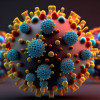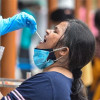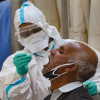
 Mr. Swapnil Bhowmick
Mr. Swapnil Bhowmick
Are Children at Risk of Omicron?
Are Children at Risk of Omicron?
Children's immune systems are said to be more resistant to coronavirus infection. Since the emergence of COVID-19 in early 2020, the majority of the young population has suffered from mild to moderate illnesses with no signs of danger or complications. Apart from the most common symptoms like fever, fatigue, cough, and multisystem inflammatory syndrome in severe cases, there were no significant cases of hospitalization or deaths among children.
Experts believe that, in light of the new Omicron variant, children may be at a higher risk of contracting the virus and developing severe symptoms, given that the younger population, those under the age of 18, has yet to receive their COVID-19 vaccines.
"We are now seeing them [children] coming in with moderate to severe symptoms, requiring supplemental oxygen, supportive therapy, and requiring hospitalization for several days," says Dr. Mathivha.
She confirms that the children in question had no prior health issues and only had a fever for the first two days, after which their condition rapidly deteriorated. "And then we lost that patient. This is the first time I'm aware of a child who died from Covid who had no comorbidities or anything else going on," she adds.
Several countries, including India, have yet to begin administering vaccines to children. Children were initially thought to be able to fight off the virus on their own, as symptoms were manageable at home and there were no signs of complications. This is why they were not given top priority for vaccination.
However, the number of COVID cases among children has only grown over time. With new variants emerging, the tally continues to rise, and cases, according to recent findings, are becoming more severe.
Having said that, while COVID vaccines do not guarantee complete immunity from the virus, they do have the potential to reduce the virus's impact. It lessens the likelihood of severe consequences and lowers the likelihood of hospitalization. Given the state of children in the economically weaker sections of India, it is critical that children receive their vaccine shots as soon as possible.
How is Covid 19 Affecting Children?
SARS-CoV-2 infection and severe clinical symptoms are risk factors for children of all ages. Although the majority of COVID-19 cases in children are asymptomatic or moderate, 18.4/100,000 children aged 0–4 and 10.6/100,000 children aged 5–17 require hospitalization, with one-third requiring intensive care.
Age extremes, such as infancy and late adolescence, are risk factors for hospitalization. Medical comorbidities, such as medical complexity, immunocompromising diseases, and obesity, are risk factors for intensive care admission.
Although children with pre-existing medical problems are obviously predisposed to severe illness, previously healthy youngsters are equally at risk for severe COVID-19 and multisystem inflammatory syndrome in children (MIS-C). Complications of MIS-C include cardiac dysfunction, shock, and respiratory failure that necessitates urgent care.
Furthermore, pediatric vaccinations are likely to be required to limit SARS-CoV-2 transmission. Children spread a variety of respiratory and gastrointestinal infections, such as influenza, pneumococcus, rotavirus, and hepatitis A.
Following the adoption of regular pediatric immunization with PCV7 in 2000 and PCV13 in 2010, both children and adults had substantial decreases in invasive pneumococcal illness. As a result, there is a compelling case to be made for childhood immunization decreasing community transmission, and avoiding adult illness.
COVID-19 Vaccinations are Risk-Free
● COVID-19 vaccinations were created utilizing research that has been available for a long time.
● COVID-19 vaccinations are not being tested. They passed through all of the clinical trial stages. Extensive testing and monitoring have demonstrated that these vaccinations are both safe and efficacious.
● COVID-19 vaccines have been subjected to, and continue to be subjected to, the most stringent safety monitoring.
● Regardless of whether you have previously had COVID-19, get vaccinated. Vaccination has been found in studies to offer a significant increase in protection in persons who have recovered from COVID-19.
● People who had been treated for COVID-19 with monoclonal antibodies or convalescent plasma, or who had a history of multisystem inflammatory syndrome in adults or children, were included in the study (MIS-A or MIS-C).
● Unvaccinated persons are still at risk from COVID-19. Some persons who get COVID-19 may become seriously sick, necessitating hospitalization, while others may experience long-term health issues several weeks or even months after becoming infected. Even those who did not have symptoms when infected can develop these long-term health issues.
The Bottom line
Getting yourself vaccinated is the safest way out of this reckless situation. So get the vaccine when you get your chance

Mr. Swapnil Bhowmick
A motivated student of Medicine & Surgery (MBBS) at R. G. Kar Medical College & Hospital, Kolkata, having a knack for reading and composing medical literature. When he's not writing content for MEDtalks, Swapnil is usually looking up the latest trends and innovations in Medicine.















Please login to comment on this article